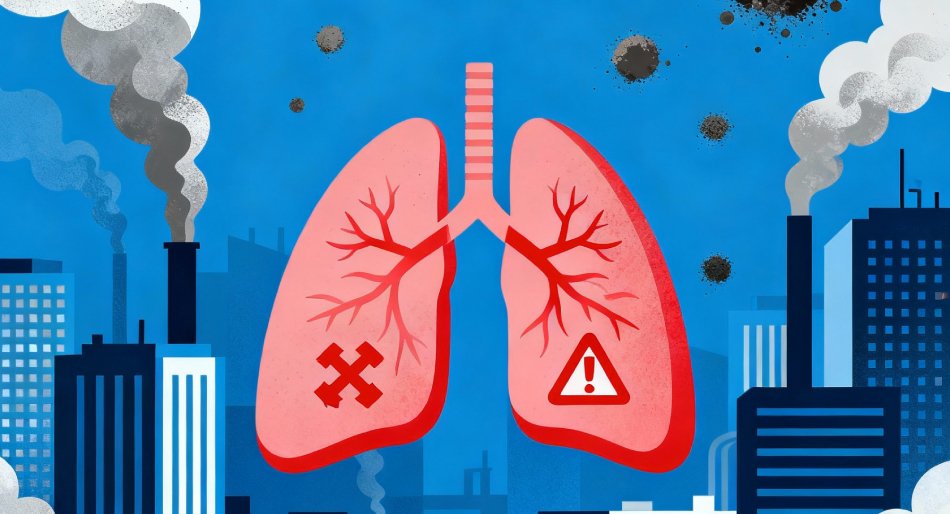Living in a city offers convenience and opportunity — but it also comes with a hidden price. With rising pollution levels, more people are finding themselves struggling with persistent coughs, shortness of breath, or fatigue. The air we breathe every day is often filled with microscopic threats that quietly chip away at our lung health.
Why City Residents Are at Higher Risk
City air is a mix of vehicle emissions, construction dust, and industrial smoke. These pollutants linger longer in densely populated areas, especially where traffic is heavy and green cover is limited. Over time, regular exposure inflames the airways, reduces lung function, and increases the risk of respiratory illnesses like asthma and COPD.
Common Pollutants That Harm the Lungs
- Particulate Matter (PM2.5 & PM10): Fine dust particles that enter deep into the lungs.
- Nitrogen Dioxide (NO₂): Released from vehicles and factories — causes inflammation.
- Ozone: Forms when sunlight reacts with emissions, irritating the lungs.
- Carbon Monoxide: Lowers oxygen in the blood, making you feel weak and breathless.
- Tobacco Smoke & Indoor Pollutants: Add another layer of damage to already strained lungs.
How Pollution Affects Your Lungs
Pollutants damage the delicate lining of your lungs, leading to chronic inflammation. This can make existing conditions like asthma or bronchitis worse, and in some cases, trigger COPD or other long-term breathing issues. Many patients report waking up with throat irritation, a morning cough, or difficulty taking a deep breath after prolonged exposure to polluted air.
Who’s Most at Risk?
Certain groups are more vulnerable to pollution-related breathing problems:
- Children, whose lungs are still developing
- Elderly individuals with weaker immunity
- Office workers and commuters are exposed to long hours of traffic
- People with asthma, allergies, or heart disease
- Rapid construction on city outskirts adds to air pollution, even in suburban areas.
- Pigeon infestations in homes and apartments cause serious lung diseases and, in severe cases, lung transplants.
- Garbage burning releases toxic smoke, worsening air pollution.
- Indoor air is polluted by mold, room fresheners, incense sticks, and poor ventilation.
Warning Signs You Shouldn’t Ignore
If you experience any of these symptoms regularly, it’s time to take them seriously:
- Shortness of breath during everyday activities
- Wheezing or tightness in the chest
- Persistent dry or productive cough
- Fatigue or disturbed sleep due to breathing issues
How to Protect Your Lungs in the City
You can’t escape pollution entirely, but you can reduce its impact:
- Use N95 masks when stepping out during peak traffic hours
- Keep your windows closed during heavy pollution days
- Invest in a good air purifier for your home
- Add indoor plants like peace lilies or snake plants to improve air quality
- Get regular lung check-ups if you live in high-traffic zones
- Prevention: Use air purifiers, especially for those with breathing issues. Avoid morning walks on busy roads. Keep indoor plants that help clean the air.
When to See a Pulmonologist
If you find your breathing worsening or your cough doesn’t improve, consult a pulmonologist. Early diagnosis helps prevent long-term complications. A simple test, like a Pulmonary Function Test, can reveal your lung capacity and detect early damage.
You can also read How to Choose the Best Pulmonologist in Hyderabad to find expert guidance and the right specialist near you.
Air pollution inflames the airways, reduces oxygen exchange, and increases the risk of chronic diseases like asthma, COPD, and bronchitis.
Yes. Continuous exposure to vehicle smoke and fine dust can permanently damage lung tissue and worsen existing conditions.
Wear masks during peak traffic, use air purifiers indoors, keep windows closed on smoggy days, and schedule periodic lung check-ups.
If you notice frequent coughing, chest tightness, or breathlessness even after rest, it’s best to consult a pulmonologist for evaluation.
Conclusion
City life may be unavoidable, but lung problems don’t have to be. Taking small, consistent steps can go a long way in protecting your breathing health. If you experience frequent coughing, breathlessness, or fatigue, don’t ignore the signs — schedule a lung health consultation with Dr Nalini Nagalla today and take a deep breath toward better health.

